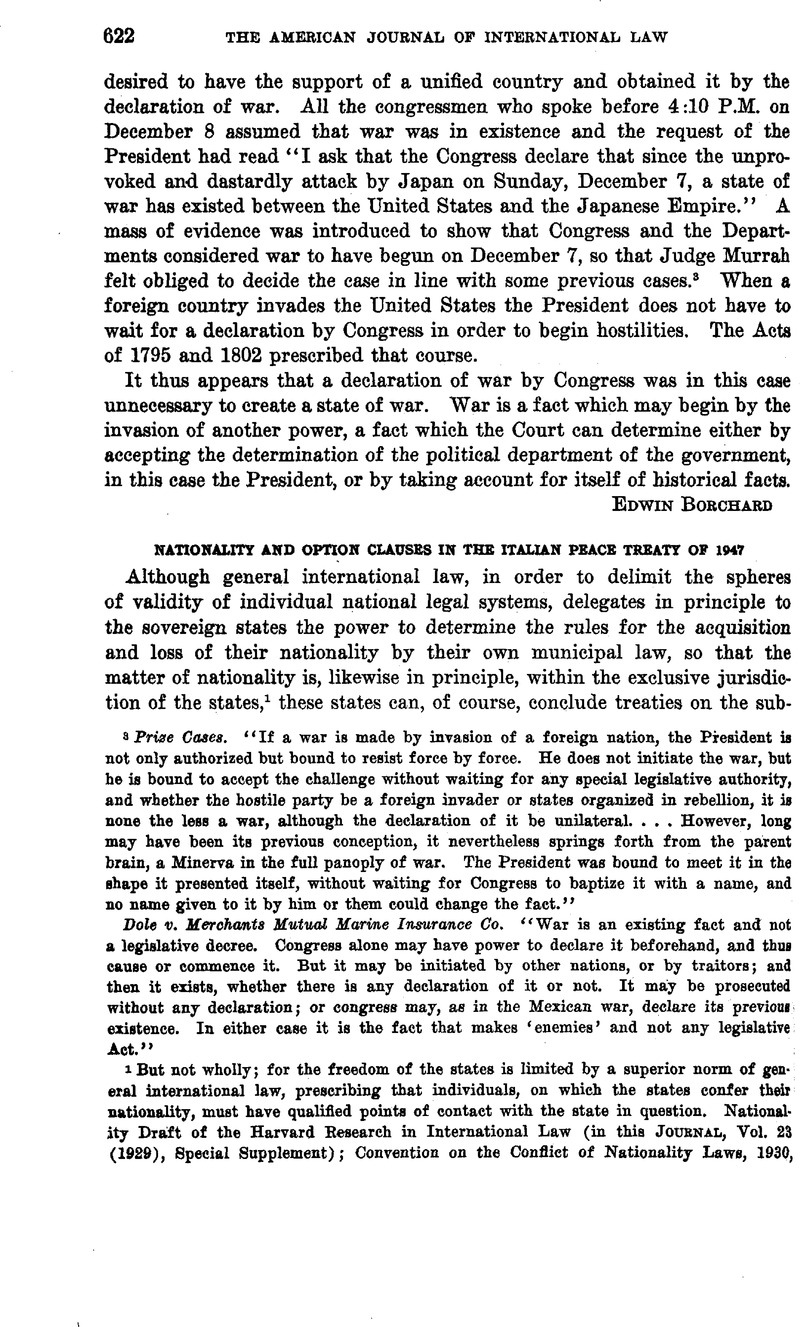Article contents
Nationality and Option Clauses in the Italian Peace Treaty of 1947
Published online by Cambridge University Press: 20 April 2017
Abstract

- Type
- Editorial Comment
- Information
- Copyright
- Copyright © American Society of International Law 1947
References
1 But not wholly; for the freedom of the states is limited by a superior norm of general international law, prescribing that individuals, on which the states confer their nationality, must have qualified points of contact with the state in question. Nationality Draft of the Harvard Research in International Law (in this Journal, Vol. 23 (1929), Special Supplement); Convention on the Conflict of Nationality Laws, 1930, Art. 1 (L. of N. C. 351. M. 145. 1930. V.); Verdross, Völkerrecht, 1937, p. 133; Briggs, H. W., The Law of Nations, 1938, pp. 157, 165. That is why the language oí the P.O.I.J. in its Advisory Opinion No. 4 is not wholly unobjectionable.Google Scholar
2 This was common juridical doctrine; see the règle de Pothier: Lorsque wie province est démembrée de la couronne, les habitants changent de domination. Even in England, notwithstanding the dogma of perpetual allegiance, “When the King cedes by treaty, the inhabitants of the ceded territory become aliens.”
3 For a full historical and theoretical study of option see: Kunz, Josef L., Die Völkerrechtliche Option, 1925, Vol. I, pp. 1–170, 301–325.Google Scholar
4 For a full study of nationality and option in the Versailles and St. Germain Peace Treaties see Kunz, work quoted, Vol. I, pp. 171–300, 326–328 and Vol. II (1928).
5 Annexed by Royal Decree-Law of May 3, 1941 (Text in Raphael Lemkin: Axis rule in occupied Europe. Washington. 1944, pp. 584–85).
6 Annexed by Royal Decree of May 18, 1941 (Lemkin, work quoted, pp. 587–88).
7 He never went there and resigned on July 31, 1943.
8 Articles 26, 30.
9 Article 28.
10 Article 23, Annex XI.
11 Although under Art. 77, par. 1 (b), of the UN Charter the trusteeship system is to apply to “territories which may be detached from enemy States as a result or the Second World War,” par. 2 of this Article leaves it entirely “for subsequent agreements as to which territories in the foregoing categories will be brought under the trusteeship system and upon what terms.”
12 UN Charter, Art. 78.
13 See this writer’s Editorial Comment in this Journal, Vol. 41 (1947), p. 439.
14 Treaty of 1947, Articles 2 and 6.
15 Article 14.
16 Articles 3 and 11.
17 Articles 19, 20, further Annex XIV, pars. 10–12.
18 Versailles Treaty, Art. 36, par. 2; Art. 91, par. 3; Art. 112, par. 2.
19 Annex XIV, par. 11.
20 No option in the case of Alsace-Lorraine (Vers. Tr., Annex to Art. 79) and Neutral Moresnet (Versailles Treaty, Art. 32).
21 It is well known that many Alsatians, German in blood and language, opted under the Treaty of 1871 for France.
22 The “ethnical option” was newly introduced in the Versailles Treaty only in cases of “non-genuine” option, either for new States (Czechoslovakia, Versailles Treaty, Art. 85, par. 1, par. 3; Poland, Art. 91, par. 4, par. 9) or, further developed as “option according to race and language” by the St. Germain Treaty, Art. 80, and the Trianon Treaty, Art. 64, finally only as an option for the “State of the race” in the Turkish Peace Treaty of Lausanne 1923, Art. 32, 34.
23 An Italian national, domiciled on June 10, 1940, in a territory ceded to Yugoslavia, who is, perhaps, a Slovene in blood and has Slovene as his mother tongue, is entitled to opt for Italy if his “customary” language is Italian.
24 Persons, “who were domiciled on June 10, 1940,” but “whose customary language is Italian.”
25 Art. 19, par. 2.
26 This formula is clearer and better than the Versailles formula: option on the part of the “parents.”
27 The term “right to opt” can mean either the fulfillment of all the requirements for a valid option or merely the declaration. In the first case a declaration not followed by emigration would not be an “exercise” of the right to opt, or an agere in fraudem legis, so that the person in question would remain a national of the successor. Under the second hypothesis the successor could expell the person in question as an undesirable alien. The Treaty of 1947 calls the mere declaration the “exercise of option.”
28 Annex XIV, par. 10.
29 Whereas they “shall” provide for other rules, they “may” require emigration.
30 The question of interpretation comes up. The Treaty uses the phrase “transfer their residence to Yugoslavia.” Does that mean emigration Is “residence” equivalent to domicile Does the phrase of Art. 20 (“transfer their residence to Yugoslavia”) have the same legal meaning as the phrase of Art. 19 (“move to Italy”)?
31 Art. 4, 21, 22, Annex VI.
- 5
- Cited by


